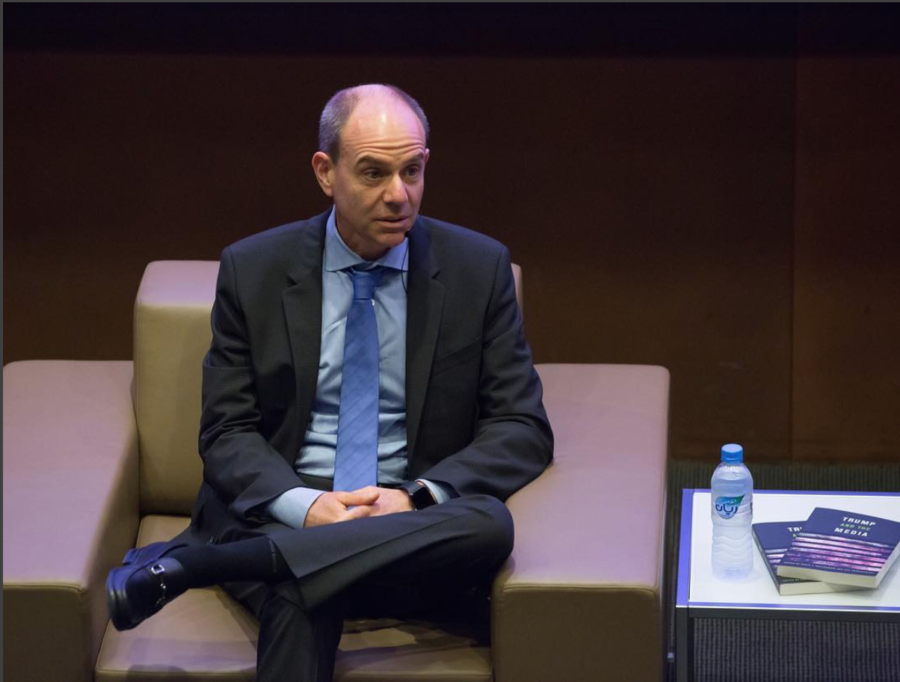Donald Trump’s Impact on the U.S. Press
Since Donald Trump’s election as U.S. president, the press has come under attack like never before, said Pablo J. Boczkowski, professor in the department of communication studies at Northwestern University in Evanston, at a community meeting at Northwestern University in Qatar on Sept. 17.
Boczkowski co-edited the book “Trump and the Media,”which he discussed during the event. The book, published by the Massachusetts Institute of Technology Press in March 2018, is a compilation of op-eds and long essays by 31 renowned journalism and technology experts. The ideas explored in the book include the role of journalism in truth-telling, emotion populism and media events, why technology matters, and how to navigate the rapid changes occurring in the relationship between information and politics.
“The genesis of the book is the [United States] election in 2016, that took many people by surprise, including many academics. And many of us started writing short pieces…. we thought it would be great to do a book that collected all this energy and different perspectives,” Boczkowski said.
One might think it a little early for a book about Trump, given his rather short presence in the political world. However, his astonishing impact on the U.S. media has intrigued many, and ultimately prompted Boczkowski and his co-editor, Zizi Papacharissi, to take on this initiative.
According to Boczkowski, the aim of the book is to highlight the “contentious relationship” President Trump has with the media and the polarizing effect this has had on American society. However, he also notes that other U.S. presidents have also not always liked the media and that attacking the press is a normal tactic in politics.
What sets the Trump era apart, however, is the rise of the concept of “alternative facts.” The term was coined by the Trump administration to legitimize their dishonesty, Boczkowski said. “Alternative facts are just another way of playing with the idea of fake news and false information… what is not cognitively dissonant spreads fast…. it is not surprising that [it] can be seen as a viable rhetoric,” he added.
False information spreads faster on social media, and this is also the reason why Trump got “several billion dollars in free campaign press,” Boczkowski remarked. One social media platform that Trump has greatly leveraged is Twitter.
“The average time a screen lasts for a young person is now 12 seconds…the tweet does the job, that’s why it’s so effective…Trump is the master of technologies…it might have contributed to his success,” Boczkowski said.
Media organizations have also begun to emphasize the entertainment factor in storytelling, giving fake news an even larger platform to sensationalize audiences, he added.
During the Q&A, Boczkowski said that he does not think there will be a return to common ground in terms of ideologies in the near future, but he added that the rise in skepticism toward media sources is a healthy quality for democratic processes.
“In the U.S., people are starting to pay more attention to interpretive queues, to framings that show perspectives…and developing their own toolkit to try to decode information. And they’re taking objectivity as a rhetorical claim, rather than a matter of fact…I think this is development for the audience at large,” Boczkowski said.
Manan Bhavnani, a journalism sophomore at NU-Q, was intrigued by the role media had played in Trump’s campaign during the divisive 2016 election.
“What I found interesting about the session was how our guest spoke about the Trump administration and their influence on media…. given Trump is so erratic, news outlets’ reaction is to focus perhaps a little too much on every tweet, and for the administration, the benefit therein is the attention,” Bhavnani said.
Mary Dedinsky, professor and director of the Journalism and Strategic Communication program at NU-Q, commented that the presentation was provocative, especially for journalism students.
“He talked about how his friend went to 20 newsrooms [in the U.S.] and found no one who knew someone who had voted for Trump. This is a problem when the press needs to cover everybody… the press really is under siege right now, and without the press you really don’t have the kind of information you need for democracy,” Dedinsky said.













